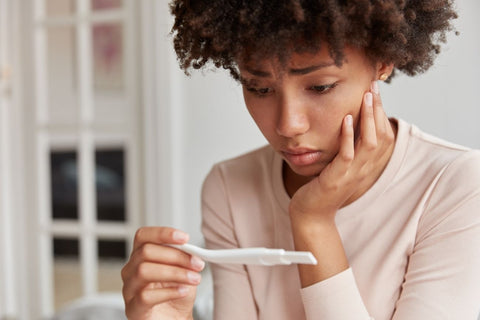Female infertility: main causes and symptoms

According to the World Health Organization (WHO) infertility affects some 186 million people in the world. The feminine registers 30% of the cases like the masculine and 20% are mixed or combined. That is, where both members of the couple are affected.
The main symptom of infertility is the inability to get pregnant after a year of unprotected intercourse. This period is less than 6 months, if the woman is over 35 years of age. Long (35 days or more) or short (less than 21 days), irregular or absent menstrual cycles may also be an indication of a disorder or pathology . Intense pain during the menstrual period, sudden changes in duration, heavy flow, or frequent bleeding between periods are symptoms that require medical attention. However, the causes of female infertility can be very varied.

Not getting pregnant can be a symptom of infertility. (Freepik)
What are the causes of female infertility?
- Obstructions or injuries to the tubes that can be caused by sexually transmitted diseases untreated or complications of unsafe abortions.
- P rolems uterine which could be of inflammatory origin (such as endometriosis), of a congenital nature or of a benign nature such as fibroids.
- Ovarian disorders such as the syndrome of polycystic ovary or ovulatory dysfunction.
- Disorders of the endocrine system that cause imbalances hormonal
- Risk factors such as chronic diseases, diabetes , cancer, or certain medications.
- The age : women have a decrease in ovarian reserve from the age of 35, limiting their ability to become pregnant.
- carry a Unhealthy lifestyle : Stress, smoking, air pollution, and having little sleep at night can all contribute to impaired female fertility.
It is essential to lead a healthy lifestyle to take care of reproductive health - Braulio Peramo

Exercising, eating a balanced diet, and avoiding tobacco and alcohol can help you preserve your fertile health. (Bruce Mars for Unsplash)
Some medicines such as anti-inflammatories or antipyretics as well as corticosteroids used to treat asthma or lupus can delay or hinder ovulation . Antidepressants and antihypertensives can increase prolactin and produce anovulatory cycles (no ovulation). Drugs to treat epilepsy, especially older ones, can affect the levels of some reproductive hormones, as well as multiple drug therapies. However, in no case is it recommended to suspend or modify any medication or treatment without the orders of a specialist doctor.
Cancer and cancer treatment can lead to reproductive disturbances. The surgeries, the Hormonal treatments , radiotherapy and chemotherapy or organ transplants can interfere with oocyte ability or cause permanent changes in fertility. These patients should consult with their health care team before undergoing any treatment to find out how it will affect their fertility and what are their alternatives to preserve it .
I want to get pregnant, what do I do?
The first step is to go to the gynecologist and make a preconception visit. Some of the causes of female infertility can be treated to get pregnant. Women with previous pathologies such as diabetes, kidney disease, obesity or cancer should visit your specialist when you want to get pregnant. In this way, the right moment is planned and the risk of gestational complications decreases. Women exposed to toxins, HIV carriers, with a history of malformations, genetic problems, a history of drug addiction or repeated miscarriages should also seek gynecological care before starting the search.
This first visit is essential because it can help detect and treat pathologies that are preventing the achievement of pregnancy. In it, questions are generally asked to know the medical history, gynecological history, family background and environmental factors such as occupation and lifestyle. In addition, tests are ordered such as:
- General analysis with complete blood count, serology and coagulation tests.
- Determination of the basal hormones, the hormones FSH, LH, Estradiol and the anti-Müllerian hormone are examined (the latter indicates the ovarian reserve).
- Ultrasound to rule out anatomical problems and visualize antral follicles (they contain immature ova and are an indicator of reproductive potential)

An ultrasound can rule out anatomical problems. (Mart Production for Pexels)
Depending on the results obtained and each particular case, the gynecologist may indicate studies complementary , refer to other professionals or prescribe the respective treatment as prenatal vitamins . It is important that the woman and her partner visit the specialist to carry out the pertinent studies and rule out or treat the masculine factor . This may be the cause of the 50% of inquiries of fertility.
advances in medicine reproductive offer many possibilities for patients or couples who have difficulties conceiving:
- Latest diagnostic techniques: treatments individualized with tests that allow selecting the appropriate dose and drug for each patient. The genetic diagnostic studies prior to implantation allow the selection of chromosomally normal embryos.
- Techniques that allow choosing the ideal moment to transfer the embryo to the uterus.
- Oocyte and embryo cryopreservation programs have evolved and produce increasingly satisfactory results.
- Advances in supplementation and conclusive studies that prove its benefits.
- More importance has also been given to emotional health, stress management and lifestyle. For this reason, many clinics offer counseling and psychological support.
All these advances place us in a position privileged in reproductive medicine and they increase hope of couples and people who want to achieve a pregnancy.
- Tags: Causas infertilidad Fertilidad Infertilidad femenina Problemas de fertilidad Salud reproductiva
0 comments



